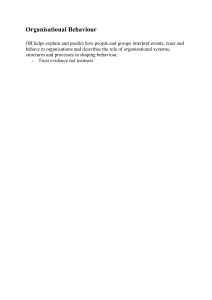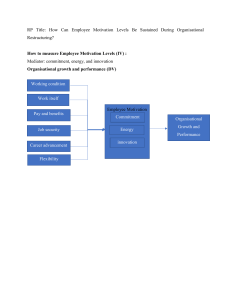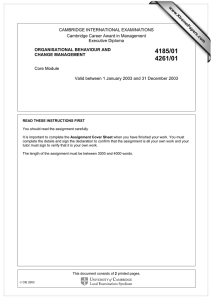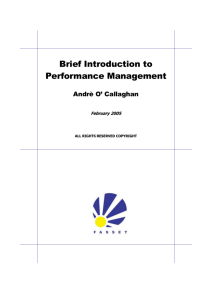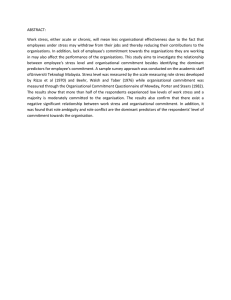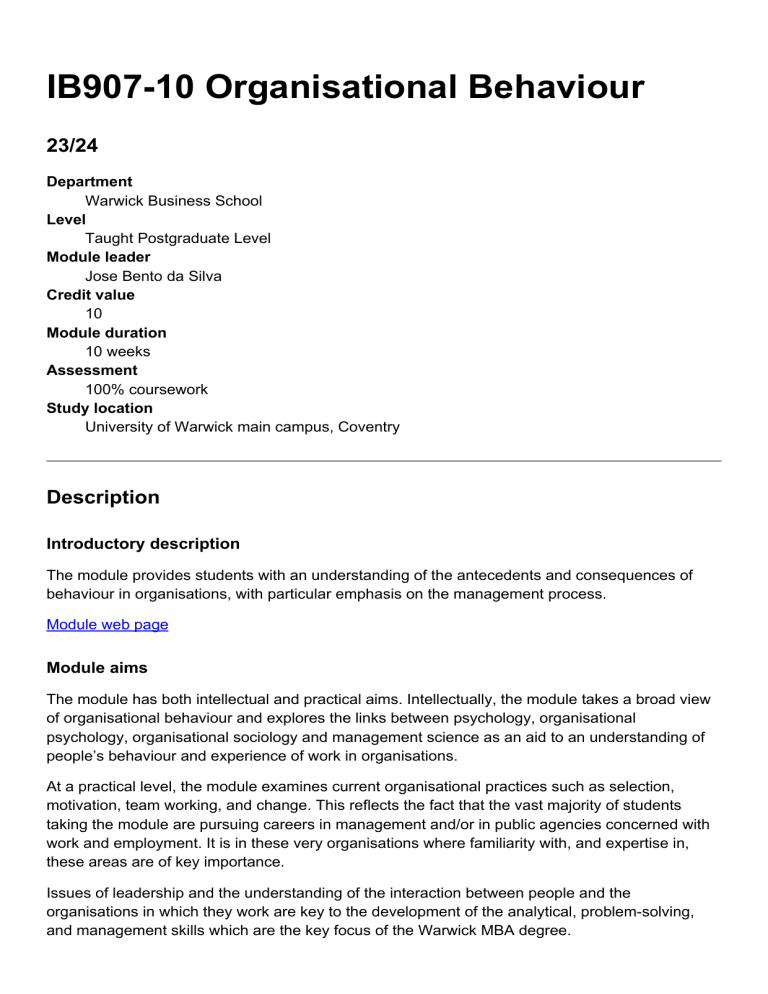
IB907-10 Organisational Behaviour 23/24 Department Warwick Business School Level Taught Postgraduate Level Module leader Jose Bento da Silva Credit value 10 Module duration 10 weeks Assessment 100% coursework Study location University of Warwick main campus, Coventry Description Introductory description The module provides students with an understanding of the antecedents and consequences of behaviour in organisations, with particular emphasis on the management process. Module web page Module aims The module has both intellectual and practical aims. Intellectually, the module takes a broad view of organisational behaviour and explores the links between psychology, organisational psychology, organisational sociology and management science as an aid to an understanding of people’s behaviour and experience of work in organisations. At a practical level, the module examines current organisational practices such as selection, motivation, team working, and change. This reflects the fact that the vast majority of students taking the module are pursuing careers in management and/or in public agencies concerned with work and employment. It is in these very organisations where familiarity with, and expertise in, these areas are of key importance. Issues of leadership and the understanding of the interaction between people and the organisations in which they work are key to the development of the analytical, problem-solving, and management skills which are the key focus of the Warwick MBA degree. Outline syllabus This is an indicative module outline only to give an indication of the sort of topics that may be covered. Actual sessions held may differ. 1: What is Organizational Behaviour? Key Concepts, Approaches and Implications 2: Motivation 3: Groups and Teams 4. Organisational Culture 5: Organisational Structure 6: Power 7: Ethics 8: Institutions Learning outcomes By the end of the module, students should be able to: • Demonstrate a comprehensive understanding of how organisational behaviour has evolved as a field, including its foundations in individual and collective action, and the roles of culture, power and ethics • Demonstrate critical familiarity with the literature, both theoretical and practical, located within its historical and methodological context • Demonstrate a critical appreciation of how ethical considerations are central to managerial decision making in the broader socio-political context • Critically reflect upon the main challenges organisational behaviour faces today, on how these relate to current organisations, and on how organisational behaviour can underpin our understanding of what management and leadership entail Indicative reading list Knights, D. and Willmott, H. (2017) Introducing Organizational Behaviour and Management (3rd edn) Hampshire: Cengage Learning EMEA Bolman, L. and Dear, T. (2017) Reframing Organisations – Artistry, Choice, and Leadership (6th edn) Hoboken, NJ: Wiley King, D. and Lawley, S., 2019. Organizational behaviour. Third edition. Oxford: Oxford University Subject specific skills Evaluate the different research methods used in the study of organisational behaviour and their practical implications for management Evaluate concepts, models and perspectives for understanding the paradoxical nature of organisations as embodying characteristics of stability and change, clarity and ambiguity, planning/design and emergence, certainty and open-endedness Evaluate and apply theories learnt to specific complex organisational contexts, and think through the implications of a chosen policy for a particular organisation, anticipating possible outcomes and how these might be dealt with by management Transferable skills Written communication. Leadership Skills. Study Study time Type Required Lectures 9 sessions of 3 hours (39%) Private study 43 hours (61%) Total 70 hours Private study description Private Study to include preparation for lectures, module introduction and self-study. Costs No further costs have been identified for this module. Assessment You do not need to pass all assessment components to pass the module. Assessment group A1 Group Presentation Weighting Study time 20% 6 hours 80% 24 hours Duration is max 20 minutes. Individual assignment Feedback on assessment Feedback via myWBS and verbal for group work Availability Post-requisite modules If you pass this module, you can take: • • • • • IB9QE-10 Leading and Managing Change IB822-10 Leading and Managing Change IB9LY-10 Management of Change IB9S3-10 Leading and Managing Change IB811-10 Human Resource Management Courses This module is Core for: • Year 1 of TIBS-N1P2 Postgraduate Taught Business Administration

